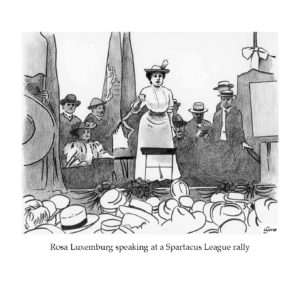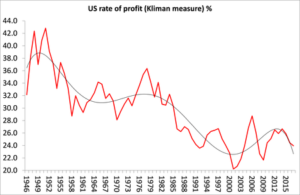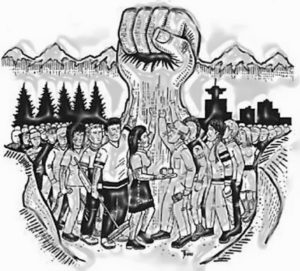
Red State Revolt is based on Eric Blanc’s “on the ground” reporting for Jacobin on the 2018 walkouts of education workers in Oklahoma, West Virginia, and Arizona. He aims to tell the stories of the walkouts . . .
Whole Number 67

Red State Revolt is based on Eric Blanc’s “on the ground” reporting for Jacobin on the 2018 walkouts of education workers in Oklahoma, West Virginia, and Arizona. He aims to tell the stories of the walkouts . . .

Feminism for the 99% calls attention to women’s mobilizations that are sweeping the world and argues for their revolutionary, anti-capitalist potential. At the same time, this compelling homage to the Communist Manifesto flips the focus from a classic notion of . . .

The modern concept of disability—indeed, the conception of disability itself, as there was no identical concept before modern times—is a by-product of capitalism. Capitalism spawns disability both as the primary producer of impairment (through industrial workplace accidents, the physical and . . .

The complex history of working-class anarchism and syndicalism in the United States has been understudied. A good part of the problem is language. German, Spanish, Finnish, and Yiddish sources have been utilized by a handful of scholars, but mostly decades . . .

Rosa Luxemburg’s legacy is very live, very relevant, and very contested. One of the ways to understand this particular political valence is to see her not only as an exceptional individual, which she surely was, but also as . . .

Many people who know something about Rosa Luxemburg would be surprised to hear the name of this talk: They know Luxemburg as the author of the brilliant pamphlets The Mass Strike and Reform or Revolution; they know that she debated . . .

Today prominent political leaders are calling themselves socialists, but even if the terms “socialist” and “democratic socialism” are being used, it is often unclear what exactly is meant by these terms and what kind of political projects they embody. In . . .

Much has transpired since Donald Trump’s announcement last December that the United States was to withdraw its 2,000 troops from Syria. While the “rapid” withdrawal initially suggested by Trump’s tweet has not come about, discussion among U.S. rulers ultimately points . . .

One of the most important issues of our time is the intensifying rivalry between the imperialist Great Powers: the United States, China, the EU, Russia, and Japan. Diplomatic rows, sanctions, trade wars, military tensions, and, ultimately, major wars now loom . . .

Last November, in one of the most hostile rental markets in the world, in a city where a majority of residents are renters, a local rent control ordinance was defeated on the ballot by a margin of 38 percent. In . . .

On May 7, 2017, the property-owning classes of France had smiles on their lips. Emmanuel Macron had been elected president with 63.90 percent of the vote against the extreme-right candidate Marine Le Pen, who had won 36.10 percent. Given his . . .

The British political system has been thrown into turmoil since the summer of 2016, when a narrow majority of voters supported a referendum in favor of Britain leaving the European Union (EU). The Conservative Party government headed by Prime Minister . . .

Why are we still teaching reading the wrong way?” Why are “more than 60 percent of American fourth-graders not proficient readers?” asked Emily Hanford, an American Public Media correspondent, in the New York Times (October 26, 2018) and on public . . .

In the face of faltering confidence in the prospects of a two-state solution, Palestinians find themselves once again in a state of limbo, bound by a peace process that has not only failed to award them independence, but has only . . .

The law of the tendency for the rate of profit to decline has been the focus of an immense and on-going debate since the publication of Vol.III of Capital in 1894. In what follows, . . .
Pessimism and optimism vie for our feelings as we survey the world and national scene. We are deeply disheartened by the continuing reports on climate change, driven largely by the coal and oil industries, most recently a report . . .

FROM THE EDITORS
BEYOND BERNIE, Sarah Mason and Robert Cavooris
IS A REVOLUTIONARY RUPTURE WITH CAPITALISM POSSIBLE?, Tyler Zimmer
EUROPE IN TURMOIL
THE YELLOW VESTS: A SOCIAL INSURRECTION, Patrick Le Tréhondat
THE ENDLESS BREXIT CRISIS: AN INTERVIEW WITH NEIL DAVIDSON, Ashley Smith
BREXITERNITY?, David Black
ARTICLES
GREAT POWER . . .

For too long, the radical left has framed debates about reform and revolution in terms bequeathed to us from an era very unlike our own. At the expense of soberly and concretely analyzing the conditions socialists face today in advanced . . .

Rosa Luxemburg’s Legacy
Rosa Luxemburg was a brilliant Polish/German revolutionary socialist theorist and political activist. Thoroughly committed to socialism from below, she believed in the necessity of radical class struggle principally in order to build the experience and capacities of the working . . .